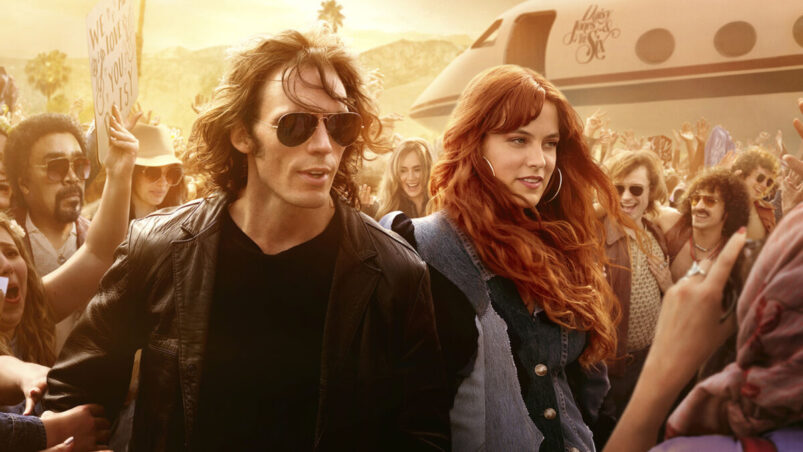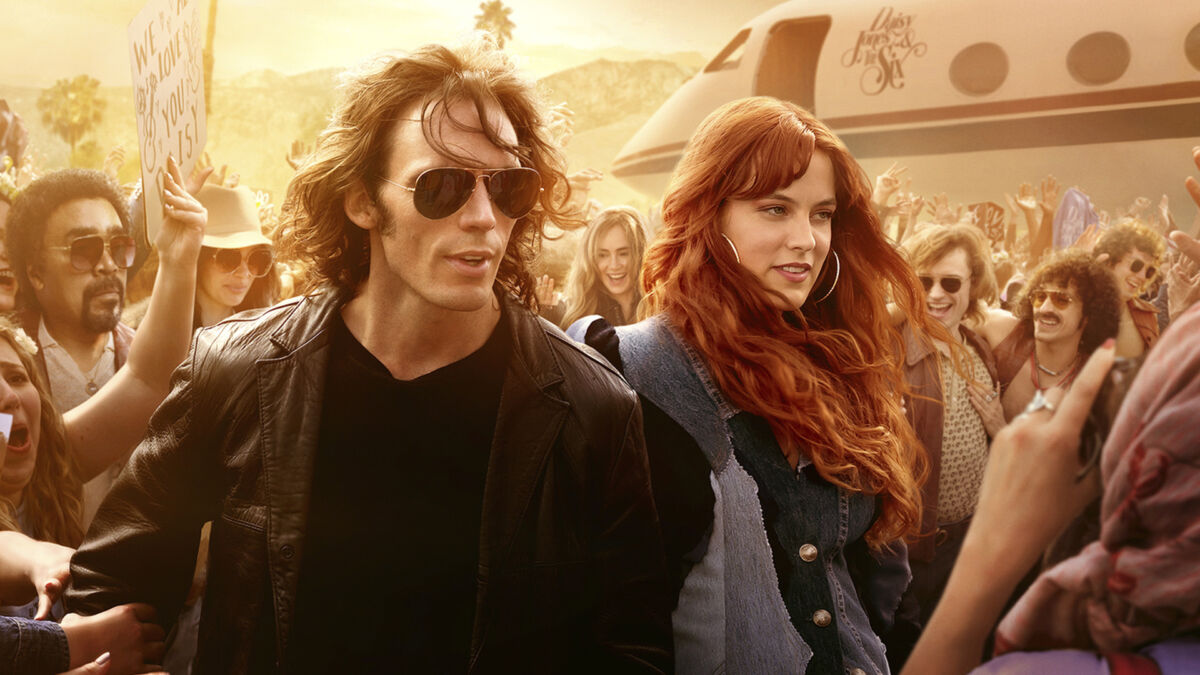Writer Taylor Jenkins Reid is having a good year. Her book Daisy Jones & the Six is adapted into an Amazon TV series, and a movie adapted from her novel One True Loves will also be released this year. Reid is a fantastic, versatile writer, experimenting all the time with different time periods and writing styles. Daisy Jones & the Six is presented entirely as a documentary transcript, so when I heard Amazon was turning it into a series, it made perfect sense. The cast also looked good, and generally you can’t go wrong when you have Sam Claflin as a lead in anything. This man is able to make even the most basic material kind of interesting.
Unfortunately, despite the stellar efforts of the cast and the amazing visual style, the series itself isn’t very compelling. This is supposed to be a documentary about a band who skyrocket to fame, but none of these characters come across as rock stars. When Teddy Price claims that the band has that IT factor, or looks on in awe when Daisy (Riley Keough) performs solo on stage, none of it feels believable. Because we, the audience, don’t feel like we’re watching regular people become rock stars. Everyone feels like they’re playacting. Even the 70s style and vibe feels like a costume party, rather than people living authentically in that time.
Compare this with films like A Star is Born and Sing Street, even That Thing You Do!, the actors feel like performers. They are able to sell the music and the reality of their characters. In this series, it’s hard to fathom why exactly Billy Dunn (Claflin) starts boozing, taking drugs, and sleeping around when he has a pregnant wife waiting for him. I mean, yeah, it’s the usual rock star spiel, but at this point, Billy’s barely started in his career for him to spiral so quickly. The show does set up that he has abandonment issues, with a small scene of him confronting his father in the first episode, but there just isn’t enough context for us to understand his addiction issues and his actions.
Daisy’s narrative exists as separate from the band’s initially, as we learn about her upbringing and the reality constantly sold to her, that she’s just not good enough. She believes it so much she even lets a random hook-up take a song off her, a song which becomes a hit, and she gets none of the recognition. This happens to her so often, with men stealing her creative insights and giving her none of the credit, that she decides to confront her own insecurities, and discover whether she has what it takes or not. Keough has decent vocal chops, and decent chemistry with Claflin, but “decent” shouldn’t be the only word that comes to mind when I think about these characters. All the musical performances feel muted and restrained, when they should be the opposite. We also aren’t given full musical numbers, just snippets, which really isn’t enough for us to get a sense of the band’s artistry.
The documentary format, where we bounce between events of the past and interviews with the band, works for the most part. We get a sense of the bitterness that exists about where things ended up, though not everyone’s equally inflamed, and Warren’s (Sebastian Chacon) wise-cracking humour provides much-needed respite from the sharp edges of everyone else.
For some reason, the series makes a constant choice to keep things small and domestic. We’re always indoors with the band, privy to their celebrations of big events like Billy and Camila’s (Camila Morrone) wedding and holidays, as well as the constant marital squabbles between the two. Where is the focus on music, and the artistry that goes into songwriting and developing a band’s sound? Daisy’s constant scribbling in her notebook and strumming on the guitar isn’t enough to allow us to feel invested in her journey as a musician, and we get the same format for Billy’s songwriting. He always exclaims that his songs aren’t good enough, and both Teddy and Daisy also suggest that, but we’re not shown enough for us to understand why that’s the case.
To her credit, Morrone is a fantastic actress. She steals every scene she’s in, and plays Camila with this effervescent energy. It’s not her fault that Camila’s relationship with Billy is so shallowly built. Why does Camila fall in love with him, believe in him so ardently, and give him the chance to love her again after his mistakes? I don’t really know. We’re also told that band member Eddie (Josh Whitehouse) is in love with Camila, and once again, there’s nothing there to show us why. Is it because of his general envy of Billy? After all, he desires to take on Billy’s position in the band at one point in the series. Or is it Camila’s general awesomeness that has him enamoured? It’s all guesswork at this point. We then move from this underdeveloped love triangle to the main love triangle between Billy, Camila and Daisy.
The biggest task that the series needed to accomplish was to get us to believe that this is a real band who lived and breathed music in the ’70s, and it fails to do that. The characters feel thin and flat despite a ten episode arc, and if films are able to accomplish so much within a shorter run-time, then there’s no excuse.
Daisy Jones & the Six should have blown our socks off, but it settles for tickling our toes just a little instead.
Review screener provided.
READ NEXT: 11 Best New TV Shows of 2022
Some of the coverage you find on Cultured Vultures contains affiliate links, which provide us with small commissions based on purchases made from visiting our site.


